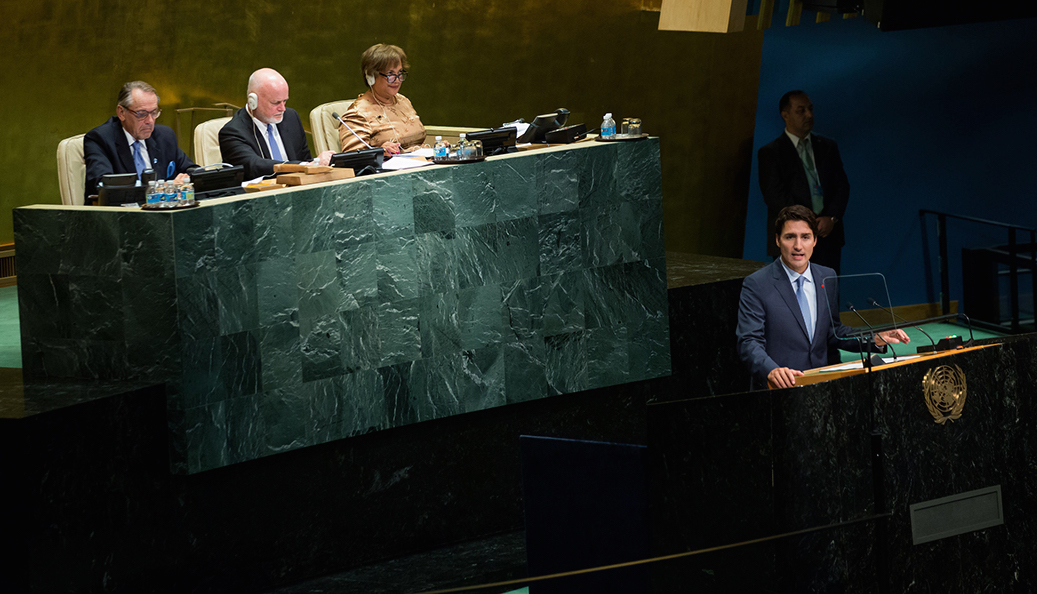As the Rohingya crisis in Myanmar (also known as Burma) deepens, Prime Minister Justin Trudeau needs to stand firmly and personally hold the country’s military leadership responsible. Canada must amplify its voice as much as possible to rally the world in ending this crisis, widely viewed as an organized ethnic cleansing.
With hundreds of thousands of lives at stake, this quickly evolving crisis requires condemnation and involvement from the highest levels of the Canadian government. Although Trudeau has expressed “deep concerns” to Myanmar’s State Consular, Aung San Suu Kyi, about the ongoing violence, he can and must go several steps further.
Trudeau needs to explicitly condemn the Myanmese military for organizing this ethnic cleansing. Since Myanmar’s 2012 constitution makes the military, not San Suu Kyi, responsible for national security and gives them a veto over constitutional amendments, solely targeting San Suu Kyi lets Myanmar’s military, who are the real perpetrators of this violence, off the hook.
Instead of a written statement merely expressing “concern,” Trudeau should condemn Myanmar’s military on camera, in both French and English, ensuring his message goes around the world. Since Trudeau is speaking at the United Nations General Assembly this Thursday, he has the perfect platform to do so. People around the world have heard and praised Trudeau’s previous stances as a human rights and refugee advocate, giving him and Canada an overwhelmingly positive international reputation. Trudeau must leverage this newfound reputation to stop this crisis.
The scale and speed of the crisis in Myanmar requires Canada to dramatically escalate its response. The Rohingya are being systematically targeted, in what the United Nations human rights chief calls a “textbook example of ethnic cleansing”; survivor accounts point to Myanmar’s military as the principal actors. Rohingya refugees have told stories of sexual assault, beatings, robberies and killings, blaming the military and their fellow citizens for the atrocities committed. The arson of Rohingya homes in Myanmar appears to be part of a systemic government campaign, as confirmed by satellite photos and survivors’ stories. Since August 25, almost 400,000 Rohingya have been driven out of their country into neighbouring Bangladesh.
This is not the first time the Rohingya people have been targeted in Myanmar. They have been subjected to bigotry for decades as demonstrated by the government stripping them of their citizenship in 1983, which has rendered them stateless to this day. Furthermore, violence towards the Rohingya has precipitously risen since the sectarian riots in 2012, when local authorities either refused to protect Rohingya from the attacks or participated in violence against them. This triggered a “boat people” crisis in 2015 where massive numbers of Rohingya fled to neighbouring Southeast Asian countries.
Today’s claims of ethnic cleansing are compounded by reports stating the Myanmese military are laying landmines at the border and requesting people to provide “proof of nationality” to return to the country, which is clearly impossible for any Rohingya to produce.
Trudeau must use his voice to help accelerate the international response to the crisis in Myanmar, with the aim of ensuring the survival of the hundreds of thousands of people currently living in makeshift refugee camps in Bangladesh. Trudeau’s voice can rally other countries into contributing to the $18 million the United Nations has requested to provide relief to the Rohingya refugees. It can help pressure Myanmar into giving investigators access to the areas where the Rohingya have fled in order to find out what exactly happened. His voice is needed to pressure Myanmar into finally restoring citizenship to the Rohingya.
Although Trudeau’s conversation with San Suu Kyi is a step in the right direction, it’s still a weak response to the purported ethnic cleansing. When we look back at this, we must be able to say our government did everything it could to stop what’s happening to the Rohingya. Previous Canadian governments were slow to act in other horrific cases of ethnic cleansing, as seen in Bosnia, Rwanda and Darfur, but history doesn’t need to repeat itself once more. It can be different this time for Myanmar.
Scott Fenwick is Executive Director of STAND Canada, a national youth-led organization advocating to make preventing and ending genocide a cornerstone of Canadian foreign and domestic policy.





